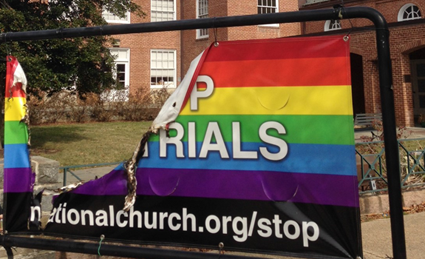
'Stop the Trials' Banner Burned
Editor’s Note: On Feb. 5, the Rev. Charlie Parker, senior pastor at Metropolitan Memorial UMC in Washington, D.C., was called down to their St. Luke’s site because someone had lit fire to the church’s “Stop the Trials” banner (see picture). Parker said that he had already started an editorial in response to Melissa Rudolph’s “Viewpoint” piece in the January 2014 UMConnection newspaper, which you can read here. Here, below, are Parker’s thoughts now.

Civil–and Ecclesial–Disobedience
I visited our St. Luke’s campus yesterday to find that someone had burned – yes, burned – our “Stop the Trials” banner, calling for a stop to church trials of clergy officiating at same-gender weddings. An earlier banner at Metropolitan had been cut down. Clearly the volatility around this issue is not going away. In the January 15 edition of the UMConnection, my Board of Ordained Ministry colleague, the Rev. Melissa Rudolph, issued a plea for the unity of our denomination based on an obedience to our United Methodist Book of Discipline.
While I am grateful for Rudolph’s desire to find a middle ground on this issue, I don’t believe that obedience to the Discipline offers that middle ground. I believe that the middle ground is found by allowing pastors of integrity and conscience the space to practice ministry as they have been called.
On Good Friday 1963, Dr. Martin Luther King Jr. and other civil rights leaders were arrested for a peaceful march in Birmingham, Alabama. While the protesters were in jail, a group of white clergy wrote an editorial agreeing with the marchers that unjust laws in the U.S. needed to be overturned, but arguing that civil disobedience was the wrong way to go about it; change, they insisted, needed to happen through the legislatures and the courts. The title of their statement was “A Call for Unity.”
We have come to know Dr. King’s response to that article as the “Letter from Birmingham Jail.” In that powerful letter Dr. King argued that for people of color, “’Wait’ has almost always meant ‘Never,’” and that every person “has a moral responsibility to disobey unjust laws.”
From the Hebrew midwives in Egypt who saved Moses, to Sophocles, to the apostles before the Sanhedrin, to Martin Luther, to Thoreau, to Gandhi, to Dr. King, to our own Book of Discipline, great leaders and thinkers have long urged us to oppose and disobey unjust laws – whether religious or civil. John Wesley, of course, modeled this very effectively in his own ministry: while we love to quote “the world is my parish,” we don’t always remember that he was responding to a charge of “trespassing” on the parishes of other clergy, by preaching in nearby fields. He defied a church structure trying to silence his calls for justice.
Our denomination has spent a lot of time over the past several decades debating whether homosexuality is a sin, and what the biblical witness about homosexuality really means. I am not going to try and rehash those arguments here. I am clear in my own wrestling with Scripture, tradition, reason, and experience that the current position of our church is wrong. I am also clear that other colleagues of good will and integrity have likewise wrestled with the issue and come to a different conclusion. What I would like to ask is, “can we respect each other enough to allow each of us to act in accordance with our conscience?”
I have no interest in trying to force fellow pastors to officiate at same-gender weddings, if that violates their pastoral integrity. But, likewise, I need to officiate at such weddings to act with my own pastoral integrity. To ask me to abide by the Discipline’s prohibition on officiating at a same-gender wedding, is to ask me to violate the Discipline’s call to “support the rights and liberties for all persons, regardless of sexual orientation,” and “relate [my]self in ministry with all persons without regard to race, color, ethnicity, national origin, social status, gender, sexual orientation, age, economic condition, or disability.”
The trials of Frank Schaefer and Tom Ogletree are a shame to our denomination and a national embarrassment. You may disagree with their decision to officiate at their sons’ weddings, but pastors of integrity and conscience should not be put on trial for acting out of their conscience.
John Wesley enjoined us, as Methodists, that “on all opinions that do not strike at the root of Christianity, we think and let think.” We need to be able to disagree on this issue and act with faithfulness as we discern God’s call. If we force our pastors to violate our consciences in blind obedience to one portion of the Discipline, we are a weaker church, and we will divide as a denomination. Stop the trials.

Login/Register to leave comment